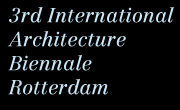----------------------------------------------------------------------------------------------------
Tuesday 29 May, 17:30
Hyper Power: Keller Easterling on Dubai
Is Dubai the new prototype of the city of the 21st century?
Keller Easterling (architect, writer, urbanist and professor Yale University School of Architecture). Lecture followed by a conversation with Michaël Zeeman.
Is Dubai what the future has in store, with its special ‘zones', outside conventional categories and rules? An urban future where media, entertainment and marketing are as much part of city life as is living and working? The power of capital shaping the hyper modern city. Can we resist this kind of future?
----------------------------------------------------------------------------------------------------
Wednesday 30 May, 17:30
no PowerTalk
----------------------------------------------------------------------------------------------------
Thursday 31 May, 17:30
Power Vision: Winy Maas and Indesem2007
The Urban Future and the Power of the Architect
Double bill: lecture by Winy Maas (MVRDV) followed by a presentation of Indesem2007: The Legacy
----------------------------------------------------------------------------------------------------
Friday 1 June, 17:30
The Power of Urban Design: From London to Almere
How can urban design become an innovative force in the city?
Presentations by Peter Bishop, director of Design for London, the new urban and architecture unit set up by mayor Ken Livinsgtone, and Adri Duivesteijn, Alderman, on Almere's urban strategy. Followed by discussion, moderated by Ole Bouman (director, Netherlands Architecture Institute).
----------------------------------------------------------------------------------------------------
Tuesday 5 June, 17:30
Power Shift: De stad verschiet van kleur
The Dutch city is changing colour. What does this imply for the way we design and organise our cities? The ‘New Dutch' and migrants increasingly define the new urban reality. But is this really taken into account in the design and planning of the city, neighbourhoods and urban environments? How to design the 'coloured city'. Introduction by sociologist Radboud Engbersen (Movisie) on the 'colour map' of the city and the aspirations of multi-cultural Netherlands. Followed by discussion with Erik Staal (chairman, housing/building asssociation Vestia Groep) Gülami Yesildal (councillor Rotterdam-Feijenoord and Wouter Vanstiphout (Crimson architecten en Wimby!). Chaired by Pieter Hilhorst.
In Dutch
----------------------------------------------------------------------------------------------------
Wednesday 6 June, 17:30
Fear in the City: Arjun Appadurai
On the geography of anger in a globalised world.
Arjun Appadurai (New School New York) is one of the leading international thinkers on culture, globalisation and the city. What are the consequences of global urbanisation, migration and above all fear and uncertainty for those living in the contemporary city? How can we feel at home in an environment beset by fear? And what does that mean for the urban citizen in different parts of the globe? Lecture followed by a conversation with Lieven De Cauter.
----------------------------------------------------------------------------------------------------
Thursday 7 June, 17:30
Public/Private Power: Publieke ruimte en private krachten
Private sector developers seek involvement in public space. What are the opportunities and responsibilities for commercial property and land developers, builders and others in shaping the public spaces of the city? A debate about chances and possibilities and the presentation of a manifesto. Programme in collaboration with AIR/Van der Leeuwkring.
With a.o. Hamit Karakus (Alderman, Housing/Spatial Planning, Rotterdam), Astrid Sanson (direcor, City & Housing Development, dS+V), Rudy Stroink (director TCN Property Projects) and members of the Van der Leeuwkring: Margriet Drijver (board, Com.Wonen), Peter van der Gugten (ceo, Proper Stok ontwikkelgroep), Hamith Breedveld (notary public, Loyens Loeff), Carol Hol (Concire). Moderator: Wytze Patijn (former Chief Government Architect, dean, Delft Univ Technology).
In Dutch
----------------------------------------------------------------------------------------------------
Friday 8 June, 17.30
De Nieuwe Nederlandse Stad #2: Design Power
The New Dutch City. The future of the Netherlands as envisaged by planners and urban architects points in divergent directions. The opposing urban futures of the so-called South Wing and North Wing of the Randstad, appear something of an Ajax-Feyenoord football match: words and ideas versus action. What underpins these competing design strategies for the Randstad area? What role for planning and design amidst the economic and political powers?
A debate with Maarten van Poelgeest (alderman Spatial Planning Amsterdam and chairman Noordvleugel 2040 local governmental steering group), Hamit Karakus (Alderman, Housing/Spatial Planning, Rotterdam), Joost Schrijnen (project director Structuurvisie Almere 2010-2030 and former director Space & Mobility, Province of Zuid-Holland), Duco Stadig (chairman, Deltametropool association), Adriaan Geuze (West 8, landscape architects) and Mariet Schoenmakers (director AM Concepts and chair Netherlands Architecture Fund).
Chaired by Maarten Hajer (member VROM-Council Netherlands Council of Housing, Spatial Planning and the Environment and professor of politics, Uninversity of Amsterdam).
In Dutch
----------------------------------------------------------------------------------------------------
Click here to see the agenda of the PowerLounge

